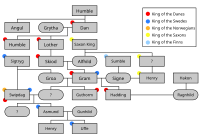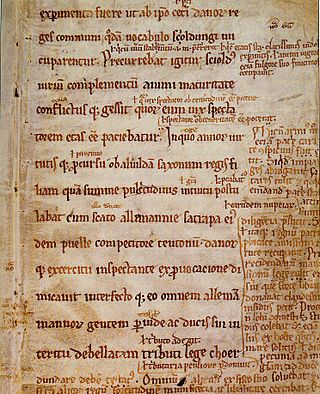
Gesta Danorum is a patriotic work of Danish history, by the 12th-century author Saxo Grammaticus. It is the most ambitious literary undertaking of medieval Denmark and is an essential source for the nation's early history. It is also one of the oldest known written documents about the history of Estonia and Latvia.

Danegeld was a tax raised to pay tribute or protection money to the Viking raiders to save a land from being ravaged. It was called the geld or gafol in eleventh-century sources. It was characteristic of royal policy in both England and Francia during the ninth through eleventh centuries, collected both as tributary, to buy off the attackers, and as stipendiary, to pay the defensive forces. The term Danegeld did not appear until the late eleventh century. In Anglo-Saxon England tribute payments to the Danes was known as gafol and the levy raised to support the standing army, for the defence of the realm, was known as heregeld (army-tax).
Fróði is the name of a number of legendary Danish kings in various texts including Beowulf, Snorri Sturluson's Prose Edda and his Ynglinga saga, Saxo Grammaticus' Gesta Danorum, and the Grottasǫngr. A Danish king by this name also appears as a minor character in the Middle High German epic Rabenschlacht. The name is possibly an eponym for the god Freyr.
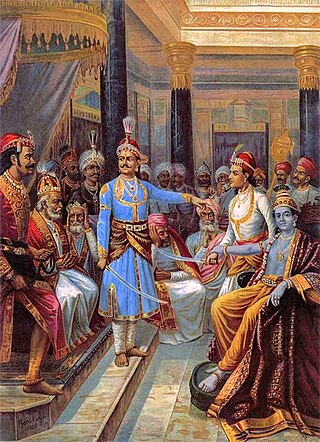
Duryodhana, also known as Suyodhana, is the primary antagonist in the Hindu epic Mahabharata. He was the eldest of the Kauravas, the hundred sons of the king Dhritarashtra and his queen Gandhari.
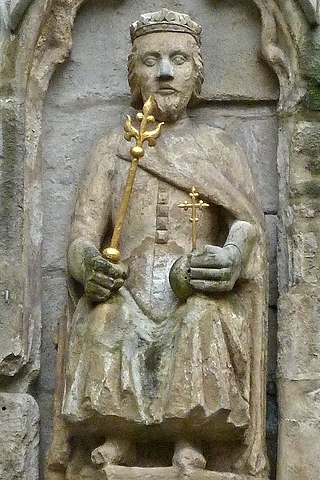
Belinus was a legendary king of the Britons, as recounted by Geoffrey of Monmouth. He was the son of Dunvallo Molmutius and brother of Brennius and came to power in 390 BC. He was probably named after the ancient god Belenus.
At the Battle of Sepeia, the Spartan forces of Cleomenes I defeated the Argives, fully establishing Spartan dominance in the Peloponnese. The Battle of Sepeia is infamous for having the highest number of casualties within a battle during the classical Greek period.
Anund Uppsale or Anoundus, 'Anund of Uppsala',, a son of Erik Björnsson of the House of Munsö, ruled Sweden together with his brother Björn at Haugi, according to Hervarar saga. He is called Uppsale because he stayed at Old Upsala, the era's religious centre. He and Björn are sometimes identified with similarly-named kings mentioned in Rimbert's Vita Ansgari and by Adam of Bremen.
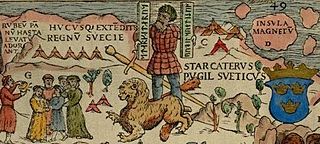
Starkad was either an eight-armed giant or the human grandson of the aforementioned giant in Norse mythology.

Pandu was the king of Kuru kingdom, with capital at Hastinapur in the epic Mahabharata. He was the foster-father of the five Pandavas, who are the central characters of the epic.
Harita is a king in Hindu literature. He is described to be the son of Yauvanāśva, and the grandson of King Ambarisha of the Suryavamsha dynasty.
Freawaru, introduced in l. 2020 of the poem Beowulf, is the daughter of King Hroðgar and Queen Wealhþeow.
Danda is a region frequently mentioned in Hindu mythology, and is prominently featured in various narratives, such as Dandaka, which refers to both a kingdom and forest of the same name. Danda was a colonial state of Lanka during the reign of Ravana, with his governor Khara ruling the province. The region served as a stronghold for all the Rakshasa tribes living in the Dandaka Forest
Ingeld or Ingjaldr was a legendary warrior who appears in early English and Norse legends. Ingeld was so well known that, in 797, Alcuin wrote a letter to Bishop Higbald of Lindisfarne questioning the monks' interest in heroic legends with: 'Quid enim Hinieldus cum Christo?' - What has Ingeld to do with Christ?

Denmark–Norway is a term for the 16th-to-19th-century multi-national and multi-lingual real union consisting of the Kingdom of Denmark, the Kingdom of Norway, the Duchy of Schleswig, and the Duchy of Holstein. The state also claimed sovereignty over three historical peoples: Frisians, Gutes and Wends. Denmark–Norway had several colonies, namely the Danish Gold Coast, the Nicobar Islands, Serampore, Tharangambadi, and the Danish West Indies. The union was also known as the Dano-Norwegian Realm, Twin Realms (Tvillingerigerne) or the Oldenburg Monarchy (Oldenburg-monarkiet).

The siege of Paris of 845 was the culmination of a Viking invasion of West Francia. The Viking forces were led by a Norse chieftain named "Reginherus", or Ragnar, who tentatively has been identified with the legendary saga character Ragnar Lodbrok. Reginherus's fleet of 120 Viking ships, carrying thousands of warriors, entered the Seine in March and sailed up the river.
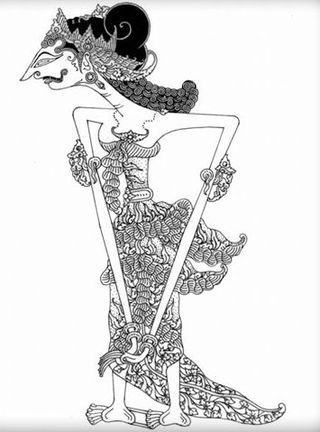
Amba is a character in the Hindu epic Mahabharata. She is the eldest and most beautiful daughter of Kashya, the King of Kashi, and the sister of Ambika and Ambalika.
Frotho III was a legendary king of Denmark. He was mentioned by Saxo Grammaticus in Gesta Danorum and in the Skjöldunga saga. Saxo's account of his reign is considered a historicized version of the Vana-god Frey and was particularly demonstrated in the section detailing the king's war against the Huns.

Guthorm or Guthormus was one of the earliest legendary Danish kings according to Saxo Grammaticus. He was a son Danish king, Gram and Swedish princess, Groa.

Loker or Lokero was a legendary Curonian king mentioned in Gesta Danorum. Exiled Danish prince, Hading and an old rover, Lysir attacked his realm, but were defeated.
